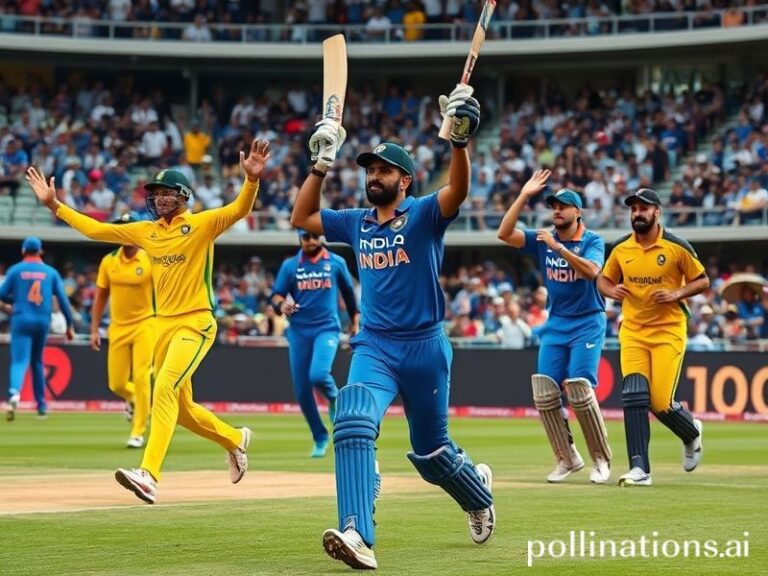Terry Gannon: The Velvet Voice Selling Global Heartbreak One Medal at a Time
Terry Gannon, the American sportscaster whose velvety baritone has soundtracked more Olympic heartbreaks than a Russian figure-skating judge on a bender, has become an unlikely geopolitical Rorschach test. From Beijing to Birmingham, viewers parse his inflection the way Kremlinologists once decoded May Day parade photos—searching for clues about which superpower is currently favored by the gods of triple-axel rotation.
In the grand casino of international sport, Gannon is the house dealer who never blinks. When a 15-year-old Romanian gymnast face-plants off the beam, his voice modulates with the solemnity of a funeral director who’s also quietly calculating overtime pay. It’s a tonal tightrope that translates across 200 territories, because disappointment, like taxes and questionable judging, is the one universal language. Canadian curling fans, Nigerian bobsledders, and that one guy in Reykjavik who watches luge at 3 a.m. all hear the same subtext: “Congratulations, tiny human projectile, you’ve just become a cautionary tale in eight different languages.”
Yet Gannon’s true genius lies in packaging nationalist agony as feel-good globalism. When the U.S. men’s basketball team collapses against a squad from a country whose GDP equals LeBron’s sneaker budget, our man segues seamlessly to a human-interest package about the winning team’s goat-herding grandmothers. Somewhere in the control room, a producer times the segment so that by the time viewers finish dabbing their eyes over Grandma Ljubica’s homemade cheese, they’ve forgotten to riot over the refs.
This sleight of hand hasn’t gone unnoticed by the world’s autocrats, who’ve studied NBC’s playbook like Sun Tzu on Red Bull. The Chinese state broadcaster now employs its own Gannon-lite anchor—a man whose job is to sound empathetic while explaining why a Taiwanese athlete’s disqualification is “for the greater harmony of East Asian meteorological conditions.” Meanwhile, Russia has taken the opposite tack: their commentators scream like vodka-fueled auctioneers, perhaps reasoning that if you can’t win medals, you can at least win decibels.
The economic implications are staggering. Advertisers pay premium rates for Gannon’s prime-time slots because his voice triggers the precise cocktail of adrenaline and schadenfreude that makes viewers impulse-buy Hyundai SUVs. European Union regulators recently launched an antitrust probe, alleging that his “sympathetic grimace” constitutes an unfair competitive advantage in the global marketplace of feelings. The case is ongoing; preliminary findings suggest the grimace is 12% more effective at selling beer than the traditional European “shrug of existential despair.”
Of course, the digital age has complicated things. When a Slovenian snowboarder sticks a 1620, Gannon’s carefully curated awe is instantly memed, TikTok’d, and auto-tuned into oblivion. Within minutes, a teenager in Jakarta has remixed his call with K-pop and footage of cats falling off countertops. The result is a post-national fever dream where medal counts matter less than shareability—a world in which the true winner is whoever can make Terry’s “Oh my goodness!” sync up with a dancing cactus emoji.
As we hurtle toward the Paris Games, where breakdancing debuts as an Olympic sport (because nothing says “ancient Greek ideal” like a windmill), Gannon prepares for his greatest tightrope walk yet. Will he manage to narrate the collapse of Western civilization with the same avuncular warmth he once lavished on Kerri Strug’s heroic vault? Place your bets, ladies and gentlemen—the smart money says yes. After all, if you can sell synchronized swimming as geopolitical therapy, you can sell anything.
And when the lights finally dim and the last medal is draped over some genetically modified teenager, Gannon will sign off with the same gentle cadence that’s soothed us through decades of proxy wars in Lycra. Somewhere, a dictator will take notes. Somewhere else, a child will decide to take up fencing because it looked cool on TV. And in the space between those two moments, the beautiful, terrible machinery of global sport will keep grinding—lubricated by that honeyed voice reminding us that, win or lose, at least we’re all suffering together.







